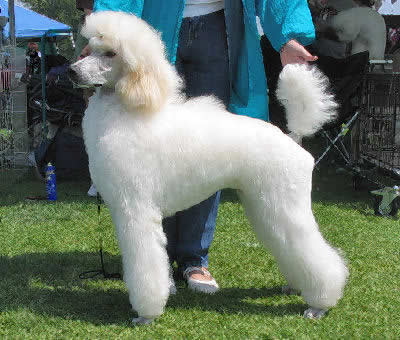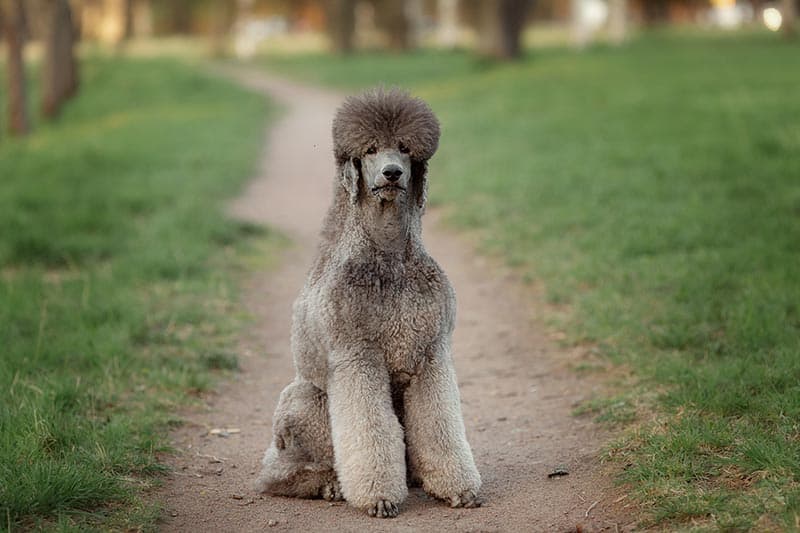
The Poodle, with its curly fluffy coat, is one of the most recognizable types of dog.
Poodles are dignified and intelligent dogs that get along well with children. They also usually do well with strangers. The Miniature Poodle, Toy Poodle, and Teacup Poodle are more excitable than the Standard Poodle
In intelligence, Poddles are considered second only to the Border Collie. These are highly trainable companion dogs, and very do well in agility skills too. When selecting a Poodle, look for eye and ear problems, skin conditions, and Von Willebrand’s disease.
- Kingdom: Animalia
- Phylum: Chordata
- Class: Mammalia
- Order: Carnivora
- Family: Canidae
- Genus: Canis
- Species: lupus familiaris
Common Name(s)
Poodle, Toy Poodle, Miniature Poodle, Standard Poodle, Teacup Poodle, Caniche, Barbone, Chien Canne
Breed Type
A non-sporting breed, the Poodle is one of the most recognizable types of dog. Although primarily thought of as a pet and show dog, the Poodle has been trained successfully for a variety of work and hunting activities.
Background
France is recognized as the Poodle’s country of origin, but there is some debate about that. It is known, however, that the development of the breed took place there. Research has shown that the Poodle is a descendant of the Barbet, and possibly of the Hungarian Water Hound.
There are three varieties of Poodles: Standard, Miniature, and Toy. There are also numerous popular hybrids of the breed, including the Labradoodle, Schnoodle, Peek-a-Poo, and Shih Poo.
Description
Poodles have wiry, curly coats and rounded skulls with long muzzles. Their ears are long, wide and fluffy. Eyes are usually dark. Colors include white, brown, black, gray, and apricot, but any solid color is acceptable.
Sizes are as follows:
- Standard: 15 inches or taller, 45-70 pounds
- Miniature: 11-15 inches tall, 15-17 pounds
- Toy: Up to 10 inches tall, 6-9 pounds
Care and Feeding
Foods containing wheat, corn, fish and poultry are recommended for Poodles. Poodles require lots of grooming. They need regular baths, and should be clipped at least every two months. The Poodle’s tail is usually docked to half its original length, particularly in the United States.
Poodles are prone to several ailments, so they need regular checkups. Vaccinations are due as follows:
- 6-8 weeks: Distemper, Leptospirosis, Hepatitis, Parainfluenza, Parvo, and Corona virus (DHLPPC)
- 10-12 weeks: Second DHLPPC
- 14-16 weeks: Third DHLPPC and rabies
- Annually: DHLPPC and rabies booster
Poodles shed very little, however they are prone to allergies. Therefore it is important to keep their environment clean.
Housing Your Dog
Poodles may live indoors or out. They are suitable for apartment living as long as they get sufficient exercise.
Social Behaviors
Poodles are very social animals, and they need to be around people as much as possible. They usually get along well with strangers, children and other dogs.
Handling and Training
The Poodle is one of the easiest breeds to train. They shine in obedience and agility training.
Activities
Poodles do not require a large amount of exercise, but they do need a daily walk. Standard Poodles need more exercise than the smaller varieties.
Breeding/Reproduction
Hereditary problems common to Poodles include allergies, hip dysplasia, Von Willebrand’s disease, and eye problems (including blindness). Potential mates’ lineage should be checked for these things.
Common Health Problems
In addition to hereditary diseases, runny eyes and ear infections are two common ailments in Poodles. These can often be treated with medication.
Availability
Poodles are reasonably easy to acquire. Prices vary greatly, and depend partially on the size of the dog.
References
“Poodle“, Wikipedia, Copyright 2008
“Standard Poodle“, Dog Breed Info Center, Copyright 1998-2008
“Miniature Poodle“, Dog Breed Info Center, Copyright 1998-2008
“Toy Poodle“, Dog Breed Info Center, Copyright 1998-2008
Cusick, William D., “What to Feed a Standard Poodle“, Referenced online, 2008
Welton, Michelle, “Standard Poodles: What’s Good About ‘Em? What’s Bad About ‘Em?“, Copyright 2000-2008
Featured Image Credit: Valeriya Chistyakova, Shutterstock
